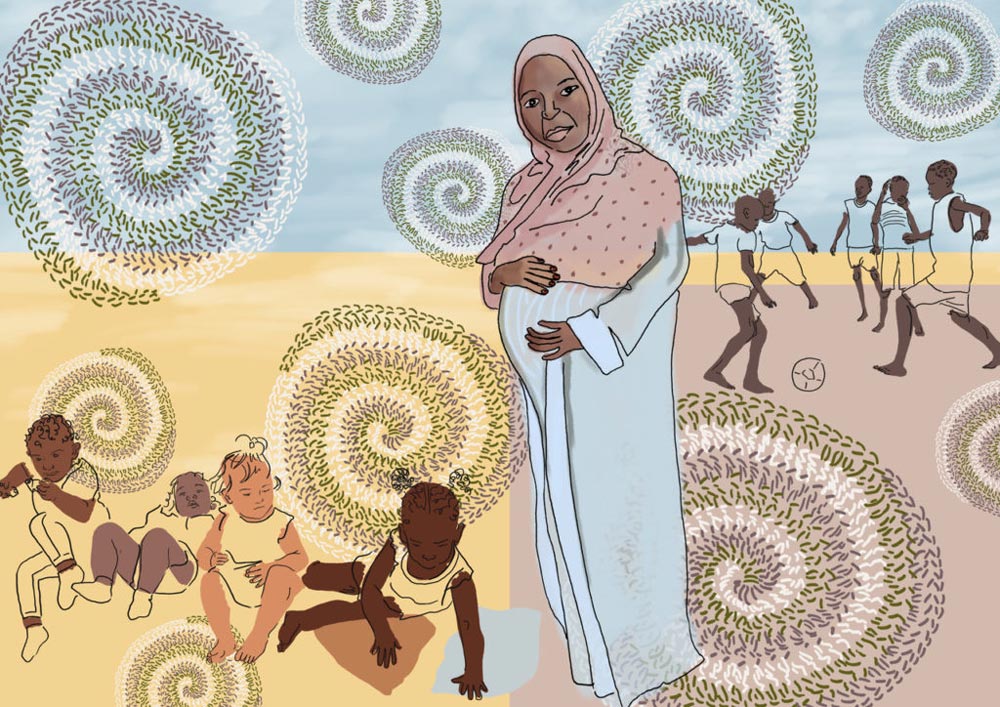How to Open British Doors

All illustrations by Laurel Molly. Find her on Instagram @laurel_molly.
When Sireen came to join her husband in the UK under the refugee family reunion scheme, she found life in the UK incredibly difficult. Everything was stunningly different; from the weather, to the culture to how to open doors. She didn’t speak any English. Her husband was working and studying long hours and she spent the days mostly by herself. Back home in Sudan she was used to the friendly noises of children playing in the street and neighbours chatting. Here in the UK she found the quiet flat and empty neighbourhood streets ominous and strange.
But it was also terrifying to venture out of the flat. When people spoke to her in the street she had no idea what they wanted and so she was frightened. She felt totally dislocated and miserable. She cried every day and thought often about returning home. When she told her husband she wanted to go back, he realised something had to change. He took her to Bristol Refugee Rights (BRR), which had helped him in the past when he’d arrived.
That visit to Bristol Refugee Right’s Welcome Centre would change everything for Sireen. On her first day she found people who spoke Arabic, people who were like her, forced to leave their homes and start from scratch in a new country. For the first time since arriving, she felt safe.
After that she kept going back. She made friends with Arabic speakers including one woman who turned out to live near her house. She enrolled in BRR’s English classes, learned how to crochet in the arts and crafts group and encountered for the first time the idea of creating a schedule for her day. All of which cheered her up, made her feel productive and boosted her confidence.
But just when Sireen felt like she was starting to get her feet, life intervened again. Due to a Home Office error, her refugee visa and the rights it bestowed, were revoked. And around the same time, Sireen miscarried her first pregnancy. With her husband in pharmacy school and her family far away, she struggled to cope with grief over the loss of her pregnancy and the stress over her visa. She kept going to the Welcome Centre and the staff would spend hours talking to her, showering her with care and concern. They also helped to distract her. She joined the Wednesday group outings to surrounding villages, the beach and the city centre. It kept her busy and surrounded by people who cared about her. Without this assistance she doesn’t know how she would have survived that time.
“The staff act like cheerleaders,” Sireen said. In every new challenge she faced, from dealing with the Home Office to learning to drive, they remembered what was happening in her life, asked about it, and cheered her on. “Having that encouragement made all the difference. You can do it, they would say. This was really helpful.”
When Sireen got pregnant again, BRR also helped her learn how to engage with the health services, prepare for childbirth, and care for an infant. When Sireen and her husband went to the hospital for her to give birth, he was amazed at how prepared and informed she was about how to navigate the system.
Once her child was born, she soon returned to the Welcome Centre. She was now volunteering for the charity— working a variety of roles from kitchen help to interpreter. The creche allowed her to continue to be involved with her child nearby. It was in the creche, during her second pregnancy that she first encountered the idea of running her own business. She wanted to work with children but now that she was pregnant again she thought she’d have to postpone her dream. They gave her the idea of working from home. But instead of just throwing out a suggestion, in true BRR fashion, they supported her in actually achieving her goal. They researched the necessary courses she needed to take, introduced her to the people on the city council who ran the induction for licensed child-minders, linked her to organisations related to the field and helped her to write her admission and safe guarding policies. They also provided the references needed in order to be licensed. She now runs a successful childcare business from her own home.
Although Sireen loves her new job taking care of children and is happy to stay in the UK, she misses just sitting and being with family. “That’s why I like BRR,” she says, “because you can sit and be with the people who care about you. You can feel the feeling of home when you just sit and talk. If I am upset, if I am happy, I go there. It isn’t one person, it’s the whole staff, it’s the whole group of people. In Sudan if you need something, you go to your grandmother, but here in the UK, Bristol Refugee Rights is my grandmother—I go to them.”
By Tannith Perry and Sireen Abdeen Hassan
Read our member Mosi’s experience in the Penally Camp Army Barracks.
Read ‘All Alone, Far Away From Home’ about a young person stuck in the asylum system.